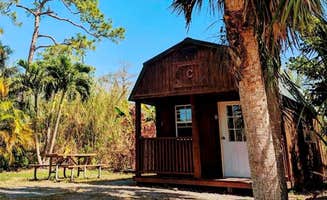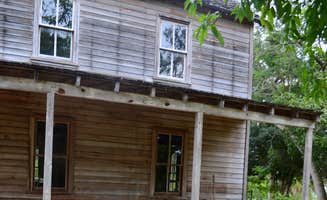Trail Lakes Campground serves as a key basecamp for exploring Florida's Everglades region, located 15 minutes from Everglades City on Tamiami Trail. The campground sits on higher ground surrounded by wetland ecosystems at about 3 feet above sea level. Winter temperatures typically range from 50-75°F with lower humidity, while summer months bring temperatures in the 85-95°F range with frequent afternoon thunderstorms.
What to do
Kayaking and canoeing access: Trail Lakes Campground provides boat rentals and launch points for paddling adventures. "We only stayed a night so didn't take full advantage of kayaks and boats, but there is a lot to do," notes Laura K., who appreciated the water access despite her brief stay.
Wildlife viewing opportunities: Picayune Strand State Forest offers excellent chances to spot native Florida species. "We biked (very sandy) and hiked. Deer roam the campground," says Penny M., highlighting the frequent wildlife sightings at Horseshoe Primitive Campground.
Historic site exploration: Koreshan State Park combines camping with cultural experiences. "This park also has a walking tour of the Korshean Settlement which was interesting," shares Mary Jo R., describing the unique historical attractions that complement the natural setting.
Star gazing: The remote location of Trail Lakes Campground creates exceptional night sky viewing. "It was a full moon the night we stayed and the stars were still incredibly bright as there is very little light pollution," Laura K. reports, emphasizing the astronomical advantages of glamping close to Everglades City.
What campers like
Privacy between sites: Many campgrounds offer good separation between camping spots. "The campground was beautiful and the sites were somewhat spread out or had vegetation separating the sites," notes Stacey C. about Horseshoe Primitive Campground in Picayune Strand State Forest.
Hot showers with good pressure: Basic comforts make glamping near Everglades City more enjoyable. "Showers were hot with good water pressure," Laura K. mentions, though she notes that "shower drains could have been better as the floors were wet throughout the whole bathhouse."
Helpful staff: Campground hosts receive consistently positive reviews. "We were so glad to find this place on The Dyrt. Once you check in, there is someone there to guide you to your site," Michelle S. explains about her experience at Trail Lakes Campground.
Trail access: Multiple walking paths extend directly from camping areas. "Several trails leave the campground from the northwest corner. Adequately marked and all are sandy," Dave V. observes at Horseshoe Primitive Campground, noting the terrain conditions hikers should expect.
What you should know
Water requirements: Not all campgrounds provide potable water. At Horseshoe Primitive Campground, "There is a water spigot here, but water is not potable, so bring your own," advises Tucker B., highlighting an important planning consideration.
Seasonal temperature fluctuations: Winter brings milder weather ideal for camping. "We are in November now and the weather is in the 70s during the day and 60s at night so the mosquitoes are not bad, but they are still present," Victoria S. notes, providing practical seasonal information.
Sandy trail conditions: Biking requires specific equipment for the terrain. "We biked (very sandy) and hiked," Penny M. reports, with Dave V. adding that "If you choose to ride a bicycle on the trails or gravel roads, you'll want the largest tires possible to have both comfort and control."
Wildlife safety awareness: Campgrounds are situated in natural habitats with diverse wildlife. "Keep your eyes peeled for a panther sighting!" suggests Tucker B., indicating the possibility of encountering Florida's native wild cats in the area.
Tips for camping with families
Reptile exhibits: Koreshan State Park Campground offers educational opportunities. "We love to hike the trails and the kids really like the playground at this campground. The historic area is really neat too and they have a farmers market on Sundays," Sarah C. shares about family-friendly features.
Spacious camping areas: Some campgrounds provide ample room for families to spread out. "We drove into camp site 20 instead of our reserved site 2. There was nobody working there so I guess switching campsites was okay," recounts Penny M., describing the flexibility sometimes available.
Accessible hiking options: Trail systems accommodate various ability levels. "There is a myriad of wading birds," Dave V. notes about the wildlife visible from trails, adding that "Numerous activities are nearby, whether you want to take an Airboat Everglade tour, Shark Valley National Park, kayaking, canoeing throughout the Big Cypress Basin."
Bug protection essentials: Insect repellent is necessary, especially during warmer months. "Having a bottle of bug spray and maybe a fogger will do just fine in this weather," Victoria S. advises for November camping, suggesting that summer would require more substantial protection.
Tips from RVers
Pull-through site availability: Some campgrounds offer easier parking options. "We were guided to a pull-thru site. This was a first for us and we were thrilled," Michelle S. explains about her experience at Trail Lakes Campground, highlighting the convenience for larger vehicles.
Leveling considerations: Ground conditions can impact RV setup. "Roads are narrow back by the campground site if you're in a big rig. Sites are also a little overgrown with shrubbery," warns Eric R. about his stay at Koreshan State Park Campground.
Size restrictions: Not all sites accommodate larger RVs. "Sites are small but will work for a tent or smaller camper. Ours is 32' and it is really tight for the site," Mary Jo R. cautions about size limitations at Koreshan State Park.
Hookup details: Utility connections vary between campgrounds. "The sites include water and electric. You are not able to pick up antennae TV unless you have high quality tall antennae. Radio stations came in just fine," advises Michelle S., providing specific information about connectivity options.



